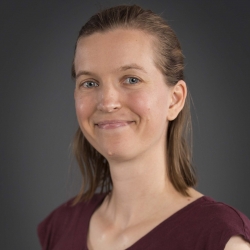Autumn Thoyre

Contact Information
Biography
Autumn Thoyre is an Associate Professor and the Program Coordinator of Environmental Studies in the School of Public Affairs & Civic Engagement. She is also Co-Director of Climate HQ, leading the SF State Climate Justice Leaders Initiatives, which aims to strengthen climate justice teaching, research, and outreach. Her research, teaching, service, and work experience span climate change mitigation, energy politics, and biodiversity conservation and emphasize social justice and sustainability. Before teaching at SF State, she taught at Colgate University as a Visiting Assistant Professor of Geography. As a Royster Fellow at the University of North Carolina at Chapel Hill, her research at the intersection of political ecology, energy geographies, and environmental sociology focused on the politics of energy-efficiency technologies and policies and led to her completion of a Ph.D. in Geography. During her master's degree in Environmental Studies and Sustainability Science at Lund University (Sweden), she worked with colleagues from over forty countries to analyze environmental politics through interdisciplinary lenses and completed research into how social networks influence our personal environmental actions. As the Natural Areas Assistant for the North Carolina Botanical Garden, she worked on public outreach, map-making, and on-the-ground habitat conservation. As an undergrad at UNC-Chapel Hill, she focused on Biodiversity and Conservation to earn a BS in Environmental Science, studied abroad in Panama with the School for International Training, and led three campus environmental and activist organizations. In her free time, you might find Dr. Thoyre reading and writing post-apocalyptic fiction, hiking, camping, or canoeing.
Teaching Interests
Dr. Thoyre has taught courses in U.S. and international environmental policy, introductory environmental studies, energy justice, energy geographies, water politics, reproductive politics, and research methods. Her courses emphasize environmental justice, critical pedagogy, and project-based learning. She uses active learning to foster critical thinking and center students’ voices. Her classes have built solar energy kits and mentored K-12 students in sustainable energy through a community service learning, Solar Suitcase Project, highlighted voices often left out of energy debates through a People's Guide to Energy Project; and developed their writing skills by analyzing and proposing new policy solutions to real-life environmental challenges.
Research Interests
Dr. Thoyre's scholarship stems from a commitment to mitigating climate change, one of the most important social justice challenges and a problem centered on energy use. She analyzes the politics of sustainable energy, focusing on U.S. energy efficiency and conservation efforts. Saving energy is one of the easiest and cheapest way to reduce greenhouse gas emissions and it has a great potential to reduce income inequalities. She uses mixed methods, including interviewing, participant observation, and policy analysis. Her findings show how some efforts to reduce energy use can reproduce inequalities and they illuminate ways to more equitably fight climate change.
Publications:
Thoyre, A. (2021) Neoliberalizing negawatts: Governance of energy efficiency as accumulation strategy. Geoforum 118: 140-149.
Thoyre, A. (2021) Negawatt resource frontiers: Extracting energy efficiency from private spaces. Environment and Planning E: Nature and Space 4(4): 1703-1723.
Thoyre, A. (2020) Home climate change mitigation practices as gendered labor. Women's Studies International Forum 78: 1-11.
Thoyre, A. and Harrison, C. (2016) Symposium introduction: Teaching energy geographies. Journal of Geography in Higher Education 40(1): 31-38.
Thoyre, A. (2015) Energy efficiency as a resource in state portfolio standards: Lessons for more expansive policies. Energy Policy 86: 625-634.
Thoyre, A. (2015) Constructing environmentalist identities through green neoliberal identity work. Journal of Political Ecology 22: 146-163.
Thoyre, A. (2011) Social capital as a facilitator of pro-environmental actions in the U.S.: A preliminary examination of mechanisms. Local Environment: The International Journal of Justice and Sustainability 16(1): 37-49.